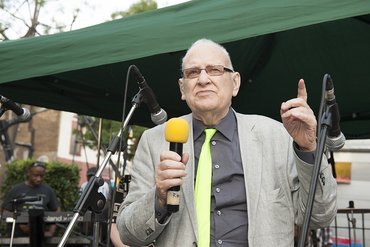Anthony Perry - Producer, Director & Writer

Fondly remembered for serving the community of North Kensington, Anthony Perry was an esteemed producer, director and writer. He was the first Director of the North Kensington Amenities Trust, established in 1971; this was the forerunner of what is now the Westway Trust. Through his work in the area, many spaces for the local community were built. However, his lasting legacy was to help transform the Notting Hill Carnival into the global event it is today.
North Kensington at the time of Perry’s appointment was a deprived area. The Westway, a dual carriageway built in the 1960s, induced hellish conditions for the local population. For the five years of its construction, it created noise pollution; houses were torn down and land left derelict. Community groups developed to make use of the land – the locals wanted green space and children’s play areas. Perry understood the Trust’s formation as a way to serve the community. He wanted to make the best use of the land for the benefit of the local population. An array of constructions followed, of what Perry called “community assets.” Acklam Hall provided space for Ladbroke Grove’s emerging talent and became a go-to London attraction, famous for punk, reggae and ska. The pan-yard for Ebony Steelband found a home under the Westway, theatre productions were performed beneath the flyover and provisions for the elderly were built. The UK’s second ever AstroTurf pitch was built; with this, Perry laid the foundation for the sports facilities which are now synonymous with the Westway. His vision was to create a central hub for community actions and events. Under Perry’s directorship, the Trust assisted in the development of the Notting Hill Carnival. In 1973, with the carnival faltering, Perry called a public meeting. At the meeting, several ideas were suggested with Perry supporting intervention by Leslie Palmer with an office and a telephone. Palmer introduced soundsystems to the event, transforming the carnival. The rest is history.
Anthony Perry recognised the cultural wealth of the area and bridged community divides. Huge musical events happened on his watch, and spaces he helped create became landmarks of the London night. Perry was a theatre and screen producer by trade. He also wrote a novel called Simba which was made into a film. Its narrative concerns the Mau Mau rebellion in Kenya, which, although dated, transcended the limited dimensions reflected in British culture at the time. Anthony Perry is remembered in North Kensington as a visionary thinker and a genuine community champion. He connected dots and opened spaces for the excluded communities. In short, he found unity in divided times.
North Kensington at the time of Perry’s appointment was a deprived area. The Westway, a dual carriageway built in the 1960s, induced hellish conditions for the local population. For the five years of its construction, it created noise pollution; houses were torn down and land left derelict. Community groups developed to make use of the land – the locals wanted green space and children’s play areas. Perry understood the Trust’s formation as a way to serve the community. He wanted to make the best use of the land for the benefit of the local population. An array of constructions followed, of what Perry called “community assets.” Acklam Hall provided space for Ladbroke Grove’s emerging talent and became a go-to London attraction, famous for punk, reggae and ska. The pan-yard for Ebony Steelband found a home under the Westway, theatre productions were performed beneath the flyover and provisions for the elderly were built. The UK’s second ever AstroTurf pitch was built; with this, Perry laid the foundation for the sports facilities which are now synonymous with the Westway. His vision was to create a central hub for community actions and events. Under Perry’s directorship, the Trust assisted in the development of the Notting Hill Carnival. In 1973, with the carnival faltering, Perry called a public meeting. At the meeting, several ideas were suggested with Perry supporting intervention by Leslie Palmer with an office and a telephone. Palmer introduced soundsystems to the event, transforming the carnival. The rest is history.
Anthony Perry recognised the cultural wealth of the area and bridged community divides. Huge musical events happened on his watch, and spaces he helped create became landmarks of the London night. Perry was a theatre and screen producer by trade. He also wrote a novel called Simba which was made into a film. Its narrative concerns the Mau Mau rebellion in Kenya, which, although dated, transcended the limited dimensions reflected in British culture at the time. Anthony Perry is remembered in North Kensington as a visionary thinker and a genuine community champion. He connected dots and opened spaces for the excluded communities. In short, he found unity in divided times.

